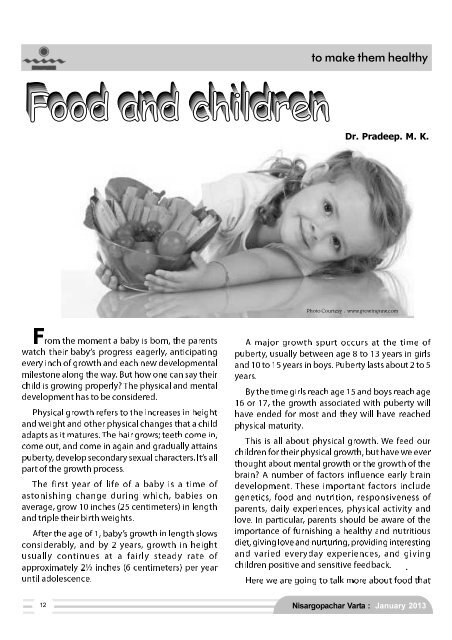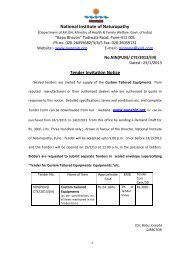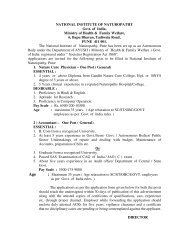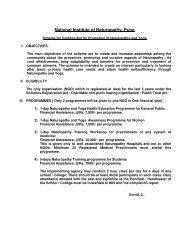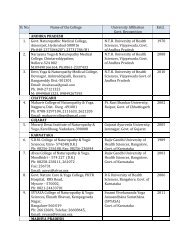Final cover.cdr - National Institute of Naturopathy Pune
Final cover.cdr - National Institute of Naturopathy Pune
Final cover.cdr - National Institute of Naturopathy Pune
Create successful ePaper yourself
Turn your PDF publications into a flip-book with our unique Google optimized e-Paper software.
to make them healthy<br />
Dr. Pradeep. M. K.<br />
Photo Courtesy : www.growingraw.com<br />
From the moment a baby is born, the parents<br />
watch their baby’s progress eagerly, anticipating<br />
every inch <strong>of</strong> growth and each new developmental<br />
milestone along the way. But how one can say their<br />
child is growing properly? The physical and mental<br />
development has to be considered.<br />
Physical growth refers to the increases in height<br />
and weight and other physical changes that a child<br />
adapts as it matures. The hair grows; teeth come in,<br />
come out, and come in again and gradually attains<br />
puberty, develop secondary sexual characters. It’s all<br />
part <strong>of</strong> the growth process.<br />
The first year <strong>of</strong> life <strong>of</strong> a baby is a time <strong>of</strong><br />
astonishing change during which, babies on<br />
average, grow 10 inches (25 centimeters) in length<br />
and triple their birth weights.<br />
After the age <strong>of</strong> 1, baby’s growth in length slows<br />
considerably, and by 2 years, growth in height<br />
usually continues at a fairly steady rate <strong>of</strong><br />
approximately 2½ inches (6 centimeters) per year<br />
until adolescence.<br />
A major growth spurt occurs at the time <strong>of</strong><br />
puberty, usually between age 8 to 13 years in girls<br />
and 10 to 15 years in boys. Puberty lasts about 2 to 5<br />
years.<br />
By the time girls reach age 15 and boys reach age<br />
16 or 17, the growth associated with puberty will<br />
have ended for most and they will have reached<br />
physical maturity.<br />
This is all about physical growth. We feed our<br />
children for their physical growth, but have we ever<br />
thought about mental growth or the growth <strong>of</strong> the<br />
brain? A number <strong>of</strong> factors influence early brain<br />
development. These important factors include<br />
genetics, food and nutrition, responsiveness <strong>of</strong><br />
parents, daily experiences, physical activity and<br />
love. In particular, parents should be aware <strong>of</strong> the<br />
importance <strong>of</strong> furnishing a healthy and nutritious<br />
diet, giving love and nurturing, providing interesting<br />
and varied everyday experiences, and giving<br />
children positive and sensitive feedback.<br />
Here we are going to talk more about food that<br />
12<br />
Nisargopachar Varta : January 2013


